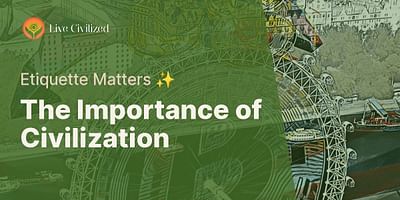Jameson Fitzpatrick is a seasoned journalist with over 15 years of experience in lifestyle and etiquette reporting. He has a knack for dissecting complex social situations and presenting them in an easy-to-understand manner. Jameson's work has been featured in several high-profile magazines and he brings his wealth of knowledge to Live Civilized to help readers navigate the world with grace and confidence.
Absolutely! Understanding etiquette in ancient civilizations is not only fascinating but also crucial for gaining a deeper appreciation of history and culture. Etiquette, or the customary code of polite behavior, played a significant role in shaping ancient societies. By studying ancient manners, we can gain valuable insights into the values, social norms, and power dynamics of these civilizations.
One of the key reasons why understanding ancient etiquette is important is because it allows us to comprehend the complexities of human interaction throughout history. Just as we have our own set of social rules and expectations today, ancient civilizations had their own unique codes of conduct. By studying these customs, we can better understand how people communicated, formed relationships, and navigated their social hierarchies.
Moreover, etiquette in ancient civilizations often reflected broader cultural and societal values. For example, in ancient Egypt, respect for authority was highly valued, and proper etiquette involved showing deference to pharaohs and other high-ranking officials. In contrast, ancient Greece placed great importance on hospitality and generosity, with proper etiquette involving the hosting of lavish feasts and treating guests with utmost respect.
Etiquette in Ancient Civilizations
| Civilization | Cultural Value | Etiquette Example | Impact on Society |
|---|---|---|---|
| Ancient Egypt | Respect for Authority | Showing deference to pharaohs and high-ranking officials | Established a clear hierarchy and maintained order in society 🏛️ |
| Ancient Greece | Hospitality and Generosity | Hosting of lavish feasts and treating guests with utmost respect | Promoted social cohesion and strengthened community bonds 🤝 |
Understanding ancient etiquette also sheds light on the role of gender and social status in these societies. For instance, in ancient Rome, where social hierarchy was deeply ingrained, etiquette dictated that individuals of higher status should be greeted with deference and respect. Similarly, in ancient China, strict rules governed the behavior of women and men, with different expectations for each gender.
By studying ancient etiquette, we can also gain a deeper appreciation for the advancements and achievements of these civilizations. For example, the ancient Egyptians were known for their elaborate burial rituals and complex social hierarchies, which were reflected in their funeral etiquette. The ancient Greeks, on the other hand, developed a sophisticated system of etiquette that emphasized the importance of self-control, moderation, and intellectual pursuits.
In addition to its historical and cultural significance, understanding ancient etiquette can also provide us with valuable lessons for our own lives. Many of the principles that guided ancient manners, such as respect, hospitality, and consideration for others, are still relevant today. By learning from the past, we can apply these timeless principles to our modern interactions, helping us navigate social situations with grace and confidence.
In conclusion, understanding etiquette in ancient civilizations is of paramount importance. It allows us to gain insights into the complexities of human interaction throughout history, appreciate the values and social norms of these societies, and learn valuable lessons for our own lives. So, let's delve into the fascinating world of ancient manners and uncover the secrets of our ancestors' social codes.












